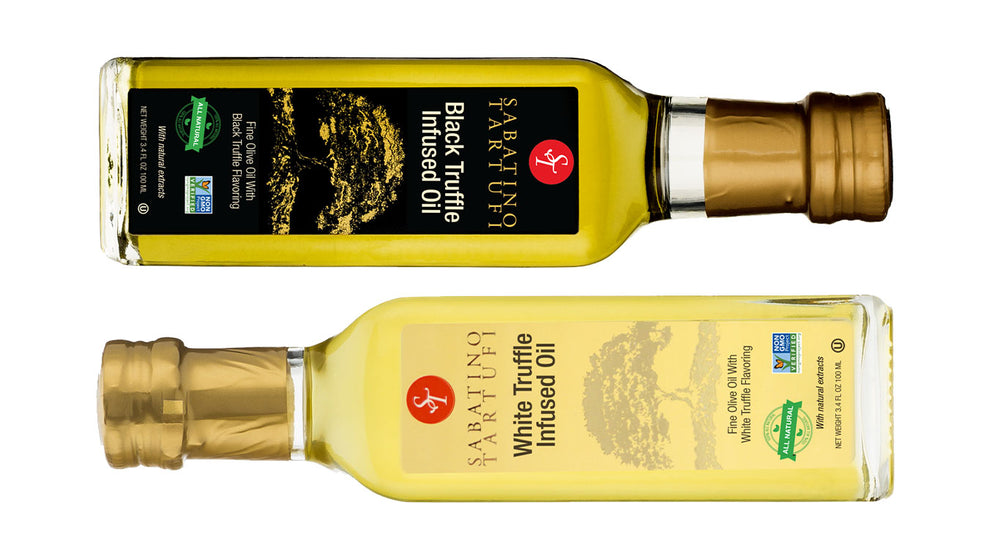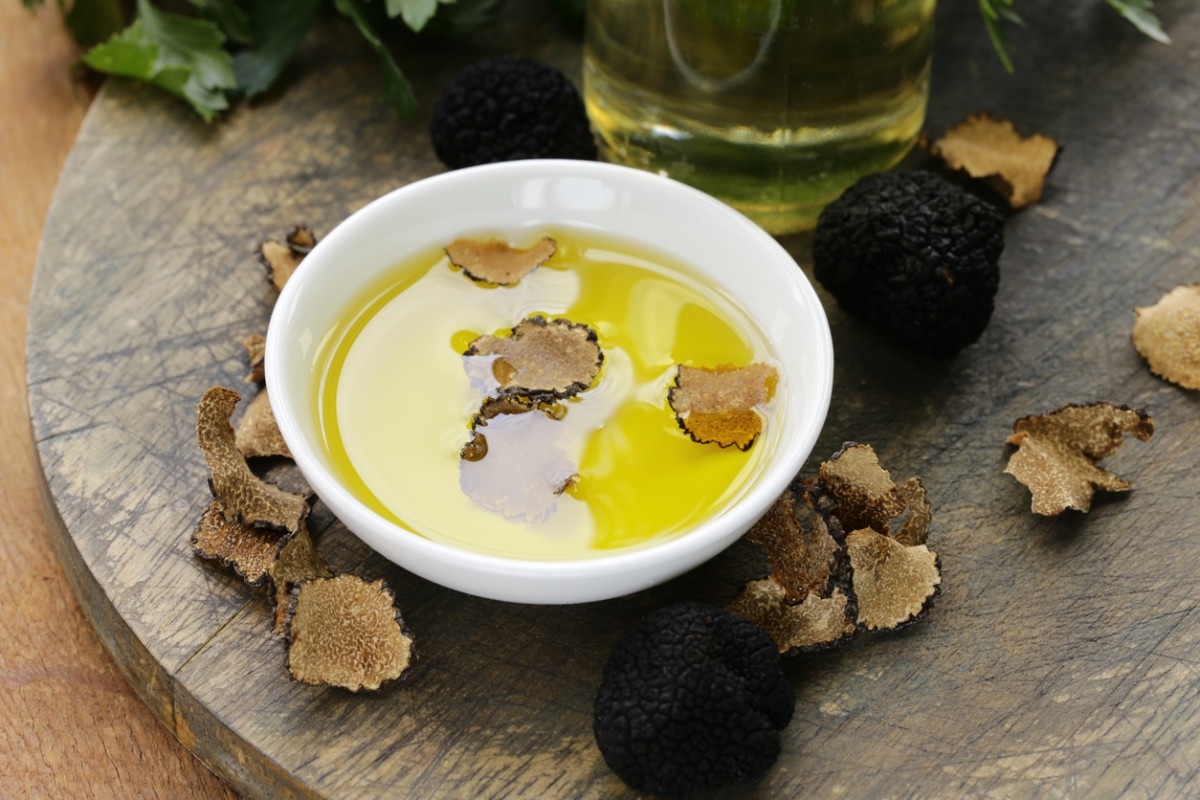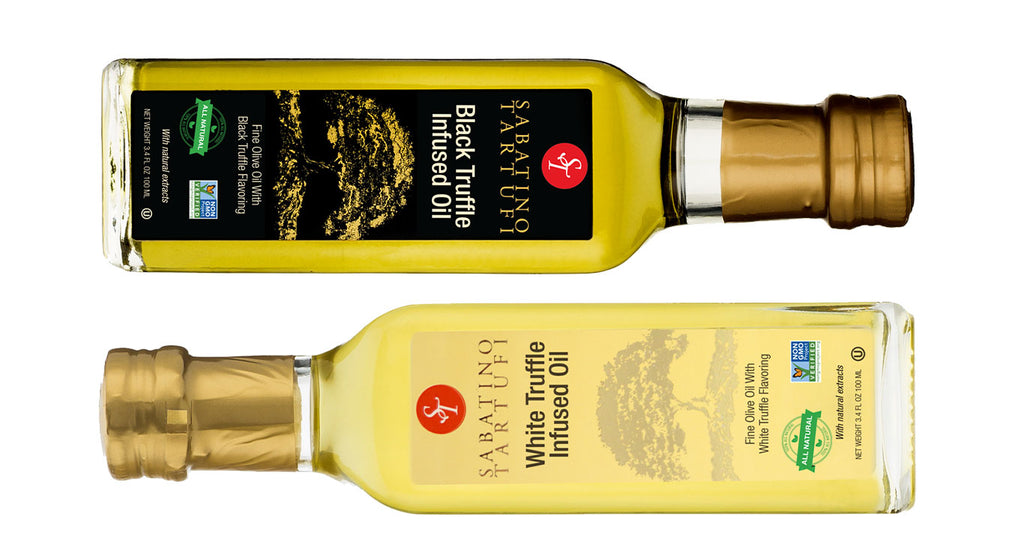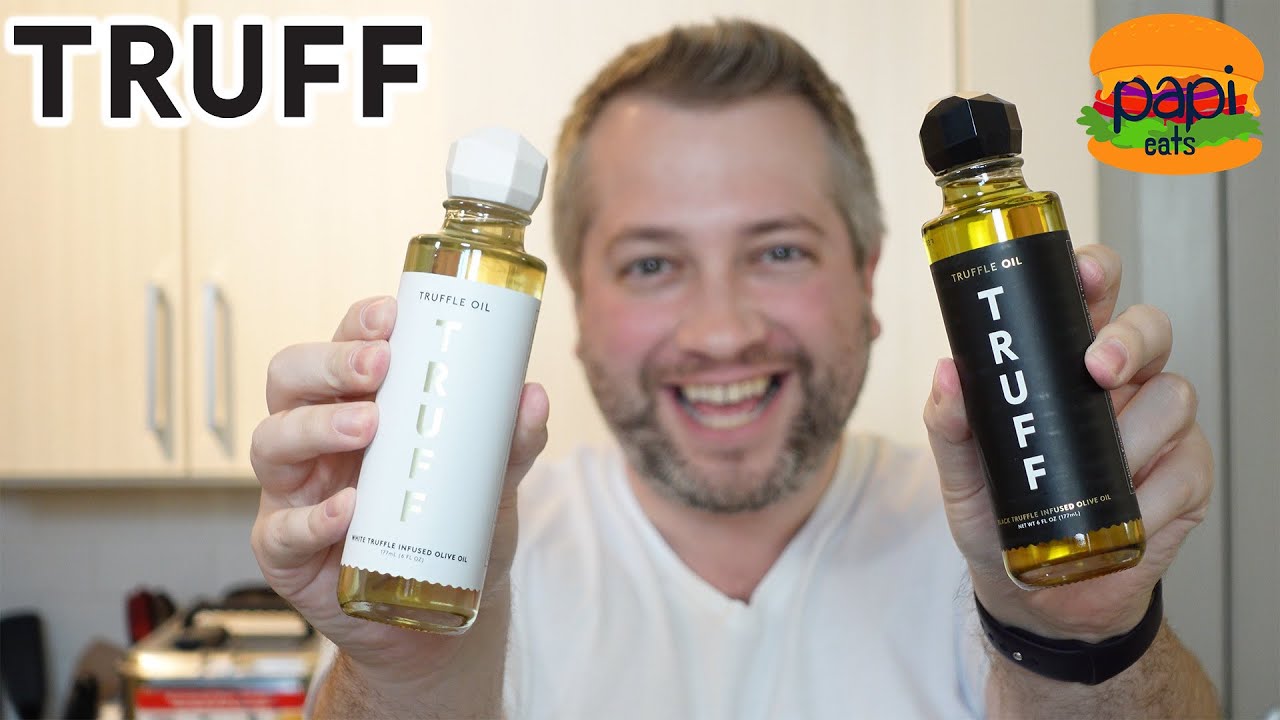Introduction

Black truffle oil and white truffle oil are both highly prized culinary ingredients that can elevate the flavors of various dishes. These truffle oils are made by infusing olive oil with the essence of truffles, giving them their distinct aromas and flavors. While they may have similarities, there are significant differences between black truffle oil and white truffle oil. This article aims to compare and contrast these two types of truffle oils, exploring their production processes, flavor profiles, culinary applications, nutritional variances, and popular brands. By understanding the nuances between black truffle oil and white truffle oil, readers can make informed decisions when selecting the right truffle oil for their culinary needs.
Overview Of Black Truffle Oil Vs White Truffle Oil
Black truffle oil and white truffle oil are both prized culinary ingredients, loved for their distinct flavors and aromatic qualities. Black truffle oil offers a stronger and earthier fragrance, while white truffle oil has a more delicate onion and garlic aroma. The flavors of black truffles are robust and intense, while white truffles have a subtler taste. When it comes to cooking, black truffle oil is excellent for enhancing rich and flavorful dishes, while white truffle oil pairs well with lighter and more delicate foods. Choosing between black truffle oil and white truffle oil depends on personal preferences and the specific culinary application.
Black Truffle Oil
Black truffle oil is a highly sought-after culinary ingredient known for its intense and earthy flavor profile. It is produced by infusing a base oil, such as olive or grapeseed oil, with the essence of black truffles. The extraction process involves steeping freshly harvested black truffles in the oil, allowing it to absorb their robust flavors and aroma. The resulting oil boasts a strong and distinctive taste that enhances dishes with its rich umami notes. Its depth and complexity make it ideal for elevating a variety of dishes, from pastas and risottos to meats and sauces.
Black Truffle Oil Production And Flavor Profile

Black truffle oil is produced through a meticulous process that involves infusing a base oil, such as olive or grapeseed oil, with the essence of black truffles. The freshly harvested black truffles are steeped in the oil, allowing it to absorb their robust flavors and aroma. This infusion creates an oil with a strong and distinctive taste. The flavor profile of black truffle oil is intense and earthy, making it a popular choice among chefs and food enthusiasts. Its rich umami notes add depth and complexity to dishes, enhancing the overall culinary experience.
Best Uses For Black Truffle Oil In Cooking
Black truffle oil is a versatile ingredient that can elevate the flavor of many dishes. Its intense and earthy taste makes it a perfect addition to various culinary creations. Some of the best uses for black truffle oil in cooking include:
- Drizzling over pasta dishes, risottos, or mashed potatoes to add a luxurious touch.
- Enhancing the flavor of soups, stews, or sauces by adding a few drops of black truffle oil.
- Finishing grilled meats, seafood, or vegetables with a drizzle of black truffle oil for a gourmet touch.
- Elevating the taste of scrambled eggs or omelets by adding a hint of black truffle oil.
- Incorporating into salad dressings or marinades to infuse a unique and indulgent flavor.
Overall, black truffle oil is a prized ingredient that can bring depth and sophistication to various dishes, making it a must-have in the kitchen.
White Truffle Oil
White Truffle Oil is derived from the highly prized and aromatic white truffle. The extraction process involves infusing a base oil, such as olive oil, with the essence of white truffles. The result is a luxurious oil with a delicate and subtle flavor profile. White Truffle Oil adds a distinct and sophisticated taste to dishes without overpowering them. It is commonly used as a finishing oil, drizzled over pasta, salads, and omelets to enhance their flavor. The delicate aroma of white truffle oil adds a touch of elegance to any culinary creation, making it a favorite among gourmet enthusiasts.
White Truffle Oil Extraction Process And Aroma

White Truffle Oil is extracted through a meticulous process that captures the essence of the prized white truffle. The process begins with harvesting the truffles at the peak of their maturity. The truffles are then carefully cleaned, sliced, and placed in a container with a neutral base oil, such as olive oil, for several days. During this time, the oil absorbs the rich aroma and flavor of the truffles. The result is a luxurious oil with a delicate and subtle aroma that exudes notes of earthiness, garlic, and even a hint of sweetness. It is this unique aroma that sets White Truffle Oil apart and makes it a sought-after ingredient in gourmet cuisine.
Cooking Applications For White Truffle Oil
White truffle oil is a highly prized ingredient in the culinary world, known for its delicate and complex aroma. It is best appreciated when used as a finishing touch to dishes, as heat can diminish its flavor. White truffle oil is commonly drizzled over pasta dishes, risottos, and creamy soups to add a luxurious and aromatic touch. It can also be used to enhance the flavors of roasted vegetables, mashed potatoes, and even scrambled eggs. Additionally, white truffle oil pairs well with soft cheeses, such as brie or goat cheese, and can elevate the flavors of gourmet salads and bruschetta.
Key Differences
The key differences between black truffle oil and white truffle oil can be attributed to their distinct flavors and nutritional profiles. Black truffle oil has a stronger and earthier taste, while white truffle oil has a more delicate onion and garlic fragrance. In terms of nutrition, black truffle oil contains slightly more calories and fat compared to white truffle oil. Furthermore, the extraction processes for both oils differ, with black truffle oil being infused with black truffle essence and white truffle oil being infused with white truffle essence. These variations contribute to the unique characteristics of each truffle oil variety.
Contrasting Flavors Of Black Truffle Oil And White Truffle Oil

The flavors of black truffle oil and white truffle oil are distinct and contrasting. Black truffle oil has a robust and earthy taste, with notes of mushroom and a deep, rich flavor that is often described as nutty or umami. On the other hand, white truffle oil has a more delicate and subtle flavor, with hints of garlic and onion. The white truffle oil imparts a milder and lighter taste to dishes compared to the intense flavor profile of black truffle oil. The choice between the two depends on personal preference and the desired taste profile for a particular dish.
Nutritional Variances Between Black Truffle Oil And White Truffle Oil
There are slight differences in the nutritional content between black truffle oil and white truffle oil. Both oils contain similar amounts of fat and calories, as they are both oil-based products. However, black truffle oil may have a slightly higher concentration of nutrients due to its more intense flavor profile. It is important to note that truffle oils are used sparingly in cooking, so the nutritional impact is minimal. The main value of truffle oil lies in its flavor and aroma, rather than its nutritional content.
Popular Brands And Recommendations
When it comes to choosing high-quality truffle oils, there are several popular brands that are trusted for their authenticity and flavor. Some top brands offering both black truffle oil and white truffle oil include TruffleHunter, Sabatino Tartufi, Urbani, and La Rustichella. These brands source their truffles from reputable regions and use traditional methods to extract the truffle flavors. It is recommended to purchase truffle oils from these established brands to ensure you are getting the best quality and true truffle flavor. Additionally, specialty food stores and online gourmet retailers are great places to find a wide selection of truffle oils.
Top Brands Offering Black Truffle Oil And White Truffle Oil

Truffle oils are highly sought after and there are several top brands that offer both black truffle oil and white truffle oil. TruffleHunter, Sabatino Tartufi, Urbani, and La Rustichella are renowned brands known for their premium truffle oils. These brands source their truffles from reputable regions and employ traditional extraction methods to capture the true essence of truffles. Their truffle oils are loved by chefs and home cooks alike for their authentic flavor profiles. To ensure you’re getting the best quality truffle oil, it is recommended to purchase from these established brands.
Suggestions For Where To Purchase High-quality Truffle Oils
To ensure you’re getting high-quality truffle oils, it is recommended to purchase from reputable sources. Gourmet specialty stores, online retailers, and gourmet food markets are great places to find a wide selection of top-quality truffle oils. Brands like TruffleHunter, Sabatino Tartufi, Urbani, and La Rustichella are known for their premium truffle oils and can be found at these retailers. It’s essential to read reviews and check the source and extraction process of the truffle oil before making a purchase to ensure you’re getting an authentic and high-quality product.
Conclusion
In conclusion, understanding the differences between black truffle oil and white truffle oil is essential for any culinary enthusiast or aspiring chef. By exploring the production processes, flavor profiles, aromas, and culinary uses of these truffle oils, we gain a deeper appreciation for their unique qualities. Whether you prefer the robust and earthy taste of black truffle oil or the delicate and musky aroma of white truffle oil, incorporating these luxurious ingredients into your dishes will undoubtedly elevate your culinary creations. Remember to choose high-quality truffle oils from reputable sources to ensure an authentic and superior product.
Summary Of Variations Between Black Truffle Oil And White Truffle Oil

When comparing black truffle oil and white truffle oil, the key differences lie in their fragrance and flavor profiles. Black truffle oil possesses a strong and earthy aroma, while white truffle oil has a more delicate fragrance reminiscent of onion and garlic. In terms of flavor, black truffle oil imparts a robust and intense taste, while white truffle oil provides a subtler and muskier flavor. It is important to consider these variations when choosing which truffle oil to use in your culinary creations. Ultimately, the choice depends on personal preference and the desired flavor profile for each dish.
Tips For Choosing The Right Truffle Oil For Your Culinary Needs
Here are some tips to help you choose the right truffle oil for your culinary needs:
- Consider the intended use: Determine whether you want a more robust flavor (black truffle oil) or a subtle taste (white truffle oil) based on the dish you plan to prepare.
- Check the ingredients: Look for truffle oils that are made with real truffles and high-quality oils. Avoid artificial flavorings or additives.
- Read customer reviews: Look for feedback from other customers to get an idea of the oil’s quality, aroma, and flavor.
- Experiment: Try different brands and varieties to find the truffle oil that suits your palate and cooking style best.
- Store it properly: Truffle oil can lose its potency when exposed to light and heat, so make sure to store it in a cool, dark place.
By following these tips, you can choose the right truffle oil to elevate your culinary creations and enhance your dining experience.
FAQ About Black Truffle Oil Vs White Truffle Oil: Contrasting Truffle Oils
Q: What is the main difference between Black Truffle Oil and White Truffle Oil?
A: The main difference lies in the type of truffle used in the oil. Black Truffle Oil is infused with black truffles, which have a stronger, earthier flavor. On the other hand, White Truffle Oil is infused with white truffles, known for their more subtle and delicate aroma.
Q: How do the flavors of Black and White Truffle Oils differ?
A: Black Truffle Oil tends to have a more pronounced, intense flavor that works well with dishes that can stand up to its boldness, such as hearty pastas or meats. White Truffle Oil has a milder flavor profile that pairs excellently with lighter dishes like salads, risottos, or seafood.
Q: Are there any differences in the color and appearance of Black and White Truffle Oils?
A: Yes, there are visual differences between the two oils. Black Truffle Oil typically has a darker hue, often resembling dark amber or even black, while White Truffle Oil has a lighter color, ranging from pale gold to light amber.
Q: Can Black and White Truffle Oils be used interchangeably in recipes?
A: While both oils are truffle-infused, their distinct flavor profiles make them better suited for different types of dishes. Black Truffle Oil is better for robust, savory dishes, while White Truffle Oil is more fitting for enhancing delicate flavors.
Q: How should Black and White Truffle Oils be stored to maintain their quality?
A: Both types of truffle oil should be stored in a cool, dark place away from heat and light sources. It is essential to seal the bottle tightly after each use to preserve the oils’ flavors and aromas. Refrigeration can help prolong their shelf life.
Q: Are Black and White Truffle Oils suitable for vegetarians and vegans?
A: Yes, both Black and White Truffle Oils are typically vegetarian and vegan-friendly. However, it is always advisable to check the product label to ensure that no animal products are used in the oil’s production process.

Marine Bay Restaurant received the International Food Culture Award 2019 as the Best Szechuan & Hunan Restaurant, enjoying a reputation in North America. Renowned for the tunnel, authentic, and cheap. Known as “Human Taste First Garden,” 2013 Vancouver culinary first book named “Best Chuan Xiang Outlets,” significant temperature and China Eastern Airlines designated outlets.